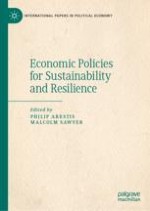2022 | OriginalPaper | Chapter
7. A Green New Deal: Opportunities and Constraints
Authors : Katie Kedward, Josh Ryan-Collins
Published in: Economic Policies for Sustainability and Resilience
Publisher: Springer International Publishing
Activate our intelligent search to find suitable subject content or patents.
Select sections of text to find matching patents with Artificial Intelligence. powered by
Select sections of text to find additional relevant content using AI-assisted search. powered by
